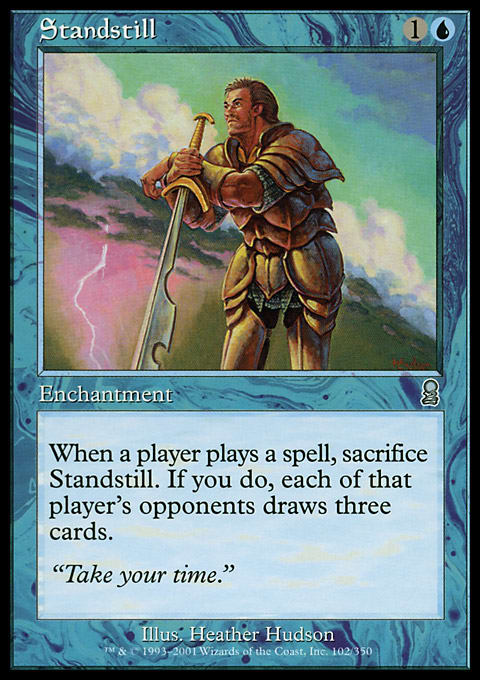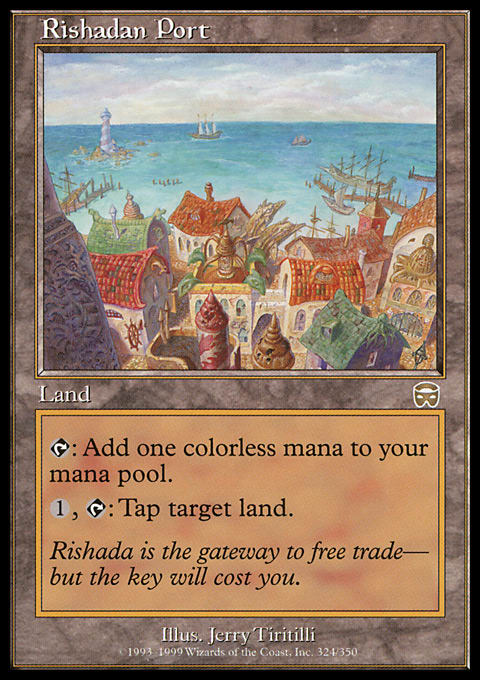Last weekend at the Regional Championship didn't go the best for Our Hero. Lost in Game 3 of Round Nine playing for Day Two; so... the worst possible outcome. But at least we all get this article, which will hopefully be a pretty good one.
Young Roman Fusco - himself almost always qualified for the Regional Championship - asked me quite a useful question: "I see so many of these guys over and over. They're obviously good enough to be qualified for the RC... But most aren't making the break to the Pro Tour. What kind of mistakes do you think they make that are keeping them from that next level?"
All tournament players can more or less maximize card advantage in Constructed play. Good ones can maximize card advantage in Limited play. We're not talking about these kinds of mistakes, or the slips of missing a point early, which can be structural but also hard to write about.
Every player at the RC level is in a way like any player in the NBA. Every one of them won a fair sized tournament to get there. While they might not have been the best player on every team they ever played on before getting into an NBA locker room, every RC qualifier was the best player in an event at least once. They make different kinds of errors; but at least some of them make the same kinds, and consistently.
Here are what I imagine to be the top five:
1. Their Range of Deck Selection is Too Limited
There is a fairy story where a mysterious warrior swoops into a magical land and wins a broad, kingdom-wide, sword fighting competition. At tourney's victorious end, he is asked what style he employed to do so. Offended, the warrior says something like "force and leverage." He denies the very concept of -tes, -fus, and -dos as misguided at best.
Specialization in too limited a range of decks, the favoring of specific styles of decks over "force and leverage" is perhaps the single greatest sin an experienced player can make. It lowers the ceiling on possible success in a way that no other error can for individual success while offering next to nothing in return.
Imagine for instance you're a Premodern LandStill specialist, and you're used to ending games with Mishra's Factory and Faerie Conclave. You have lots of nonbasic lands because your plan is to plop down a Standstill and initiate offense without turning it on by casting a spell. Let the stupid opponent cast the first spell!
But the metagame shifts and a ![]()
![]() Land Destruction deck with Rishadan Port, Wasteland, and Treetop Village rises to become one of the best new strategies in the format. Your adherence to
Land Destruction deck with Rishadan Port, Wasteland, and Treetop Village rises to become one of the best new strategies in the format. Your adherence to ![]()
![]() might hurt you in more than one way. You might willingly choose old tech that will perform worse, on average, than the hot new dish. Worse, that new deck itself might be extra good against you. Your engine is to slow down the game with Standstill and then attack with Mishra's Factory... But this new deck has a 3/3 in Treetop Village that not only trumps your 2/2; but can initiate offense without triggering Standstill the same way you can!
might hurt you in more than one way. You might willingly choose old tech that will perform worse, on average, than the hot new dish. Worse, that new deck itself might be extra good against you. Your engine is to slow down the game with Standstill and then attack with Mishra's Factory... But this new deck has a 3/3 in Treetop Village that not only trumps your 2/2; but can initiate offense without triggering Standstill the same way you can!
But that's not all!
Everyone else sees the rise of the ![]()
![]() deck, and starts playing Tsabo's Web to try to combat it. Tsabo's Web beats up your deck of all nonbasic lands just as badly as it does
deck, and starts playing Tsabo's Web to try to combat it. Tsabo's Web beats up your deck of all nonbasic lands just as badly as it does ![]()
![]() ... Only you don't get the benefit of all the extra value.
... Only you don't get the benefit of all the extra value.
Going into a big tournament, picking your deck too far out is one example of this error. You might not just be left behind, but unable to adapt to what might now have the highest ceiling.
None of that is not the worst part, though. Whatever deck you actually choose to play (or why) is kind of perpendicular to having too limited a range; especially when it means you can't play (or even understand) other decks at a high level. Such a lack of facility with other people's decks can cost you games in the tournament itself... But also ruin play-testing.
Imagine for instance your range in Standard doesn't include Four-Color Slogurk. That might be problematic if Gurk is the best deck, but it's also an issue in games against it. Think for a second if you know how to assemble the Vial Smasher combo. You might have a vague idea about untapping Rona, but do you know how Slogurk and Rona come together with Honest Rutstein discounts and cheap Takenuma and Otawara activations to actually dig through your deck?
If you don't know how to assemble the combos yourself, you might not realize that, amid all the dangerous creatures in the opposing deck, it's actually the comparatively innocuous Relic of Legends that facilitates, well, everything. In a world of finite resources, basic information RE: what you have to handle in what priority might be the difference between winning and losing.
Or consider the one copy of Jace, the Perfected Mind that most Slogurk decks can bring to bear. Is it a random one-of? You might not realize - if your range doesn't include Slogurk itself - that repeated Takenuma use can help you dig to Jace, and then that any number of recycled Takenumas + Jace can spell doom for an opposing ![]()
![]() mage. Because
mage. Because ![]()
![]() takes so long to win, and because Takenuma can't be countered, this is a deadly, even inevitable, concoction.
takes so long to win, and because Takenuma can't be countered, this is a deadly, even inevitable, concoction.
2. They're Too Greedy in Games They Don't have to Be
At the RC I made what was very nearly an extremely expensive mistake.
I had managed to grind my Four-Color Slogurk opponent to no cards in hand, though they still had some sweet creatures and two copies of Relic of Legends. Their graveyard was stacked, but no cards in hand... Now was my chance.
I checked my own graveyard and saw two copies of Memory Deluge. No cards in hand. I'll still have a huge advantage.
"Farewell artifacts and creatures... BUT NOT GRAVEYARDS."
I would have had a huge advantage if I had played right, too. But I was just too greedy! My opponent ripped a Slogurk and started to work me for unbelievable value. I ultimately managed to win on damage with exactly zero cards in my library, but it was only because my opponent also blundered (more on that in a second).
The goal of Magic isn't to win by a million. You only need to win by 20.
3. They Can be Too Conservative
A contrasting issue is not being greedy enough when they have to.
A common groove that players with some good experience - but maybe too much risk aversion - have is to play too conservatively. They play around too many bullets, even obvious ones sometimes. Let's say you often hold back until you can pay for No More Lies. Well sometimes you're under damage pressure and you have to act now. Sure, you might get caught by the "obvious" Counterspell... But you also might lose to inaction.
Separately there is a structural issue where people think they're engaging in a lot of Agency, but all they're doing is prolonging a game that they are unlikely to win. If losing is nigh inevitable, it might be better to just quit and hopefully have time to get one of the next ones (or even just finish a match).
4. They Don't Play Out Lands in a Long Game
Remember the game that I didn't exile graveyards?
The only reason I was able to win was because my opponent didn't play out enough lands in a game that was going very long. He had an overabundance of lands, of course, thanks to Slogurk; but held stuff back for interaction.
What ended up happening in the end was that I had four two-power creatures going against four life... But he ran out of Blue mana. A Boseiju took out my Restless Anchorage, but he didn't have enough blue to Otawara all my tokens.
Why not play out lands in general? Sometimes you have a good reason (preserving cards for discard or looting effects, maybe); but generally it's just to bluff. There can be some merit to this, of course. Every game is different... But I'd just encourage you to think about your play pattern in holding back land drops, especially in the crime Spree-happy world of the current Standard, where lots of land drops can imply meaningful function.
5. They Don't Recognize When They Have to Break the Rules
As we said before, maximizing card advantage in Constructed and Limited is almost hard-wired into tournament players. "Tap all your lands, or as much land as you can every turn" is not far behind. Think of all the shortcuts you employ; how you might use life as a resource, or tend to prioritize cards over life.
These are important basic guidelines for play... But like anything, they can force play that is too restrictive. Are the basic tenets of Magic the kind of things that skilled players should be breaking every round?
No. Of course not. But they might be the kinds of things that need to be broken during a particular round of an invitation-only tournament in order to thread a very narrow needle, so one can make the next level.
LOVE
MIKE






























